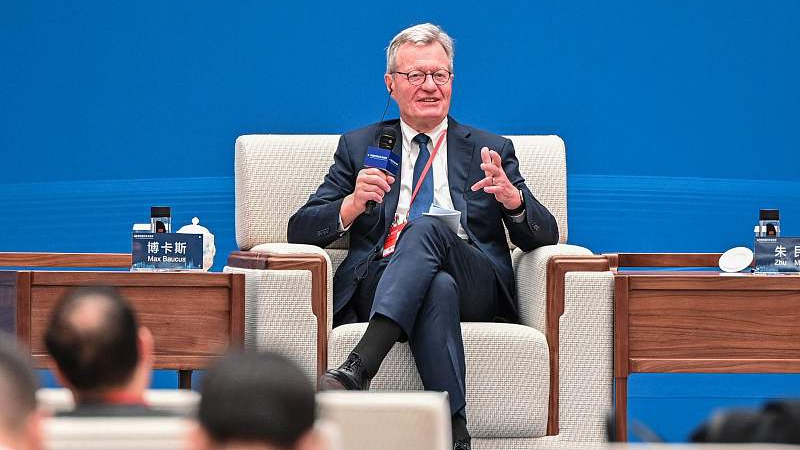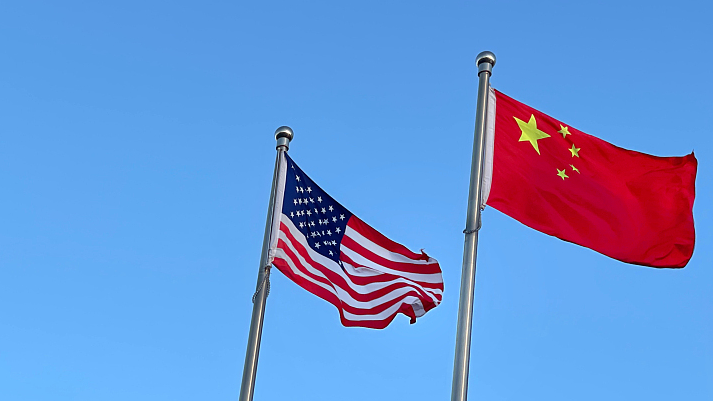
Max Baucus, former U.S. Ambassador to China, speaks during the Lanting Forum at the Grand Halls in Shanghai, China, April 21, 2023. /CFP
Max Baucus, former U.S. Ambassador to China, speaks during the Lanting Forum at the Grand Halls in Shanghai, China, April 21, 2023. /CFP
Editor's note: Andrew Korybko, a special commentator on current affairs for CGTN, is a Moscow-based American political analyst. The article reflects the author's views and not necessarily those of CGTN.
Former U.S. Ambassador to China Max Baucus was recently interviewed by Forbes as part of the U.S.-China Business Forum in New York that was organized by that magazine's Chinese edition. America's former top diplomat in China, from 2014-2017, shared some important observations about the state of bilateral ties and offered pragmatic proposals for improving them. The present piece will summarize his insights before analyzing them in the present context of Sino-U.S. relations.
What stood out the most was Baucus' candidness, particularly with respect to not eschewing his country's responsibility for what he accurately described as the "terrible" state of bilateral ties. According to him, China-bashing carries no domestic political cost and has nowadays become an "intense" bipartisan issue. Democrats and Republicans alike are unfriendly towards China as evidenced by U.S. President Joe Biden enacting similar sanctions as Donald Trump did.
Furthermore, both the federal government and some state governments are abusing national security pretexts to restrict Chinese investment in order to help local companies, yet neither ever shares evidence of their claims. Former Ambassador Baucus believes that this undermines the U.S.'s reputation. He also reminded everyone that his country spies on China a lot, but the media ignores that. Given this toxic environment, he expects both parties to ramp up their rhetoric ahead of next year's elections.
China knows that a lot of what's said about it inside the U.S. is for electioneering purposes, but it still doesn't help repair the trust that began to rapidly deteriorate after Trump demonized China. America's former top diplomat in that country also assessed that the Chinese want to see some positive actions from his side to back up their occasionally positive rhetoric. To that end, he suggested unilaterally doing something simple to rebuild trust; but he conceded that neither is interested.
Nevertheless, Baucus is upbeat about the role that business ties can play in stabilizing Sino-U.S. relations. He believes that the expansion of commercial relations leads to the expansion of personal ones too, which can help counteract most Americans' unfamiliarity with China. Moreover, strengthening business ties will also strengthen communication, and this in turn strengthens trust. These are all solid points that deserve to be reflected on.
The most unforgettable part of former Ambassador Baucus' interview with Forbes was when he described China and the U.S. as being in an "arranged marriage" brought about by geopolitical and economic factors; They're "joined at the hip" because of them, he said, and divorce isn't possible. These two therefore have to learn to live with one another despite their very different systems. Had it not been for this relationship, he warned that "we'd be in a real world of hurt" by now due to the latest tensions.

Flags of China and the U.S.. /CFP
Flags of China and the U.S.. /CFP
His words, which were spoken from a position of authority given that he used to serve as America's top diplomat in China, should be heeded by all. Additionally, Baucus is a Democrat just like Biden, but he isn't afraid to criticize the ruling administration since he truly feels that it's recklessly endangering bilateral ties by following many of Trump's policies. Had the incumbent's team not listened to Trump-era hawks, then relations with China might have stabilized or even improved by now.
It can't be known for sure why they did this, but the answer might be connected to what he earlier said about how national security pretexts are abused to restrict Chinese investment in order to help local companies. Instead of opening a new chapter in Sino-U.S. ties after the 2020 election, the Biden Administration fell for the Trump-era hawks' fallacious claim that America's post-pandemic economic recovery can only be ensured by retaining and expanding anti-Chinese sanctions.
Once the fateful decision was made to stay the course in this regard, it became much more difficult to reduce the influence of these selfsame hawks, who exploited this self-inflicted damage to bilateral ties to falsely claim that it proved that they were right all along about China being a "systemic rival." Accordingly, the only way to reverse this negative trajectory in their relations is to stop restricting trade and financial ties with China ahead of gradually removing all the sanctions from the Trump era onwards.
It's here where the Biden Administration can implement former Ambassador Baucus' proposal to unilaterally do something simple to rebuild trust by either announcing a halt to these restrictions or even rescinding one of them. Such a goodwill gesture would help get bilateral ties back on track with all that entails for helping local companies.
Biden should therefore seriously consider this for the greater good of the world despite it being unpopular at home since he has a responsibility to stabilize ties with China.
(If you want to contribute and have specific expertise, please contact us at opinions@cgtn.com. Follow @thouse_opinions on Twitter to discover the latest commentaries in the CGTN Opinion Section.)